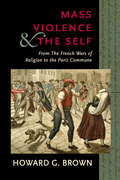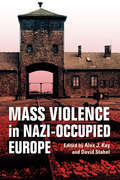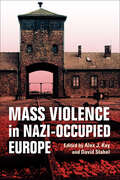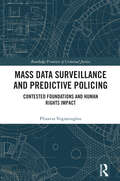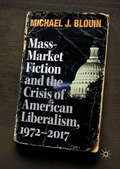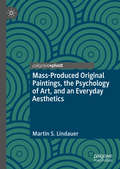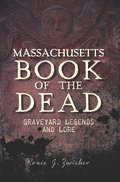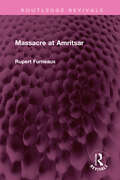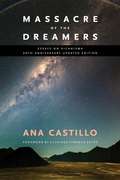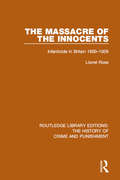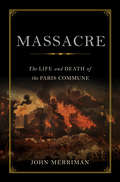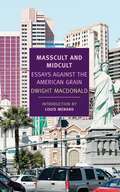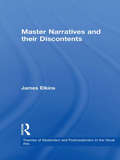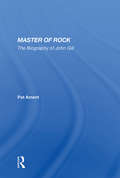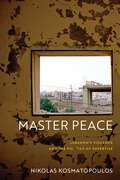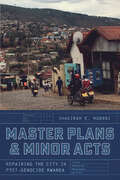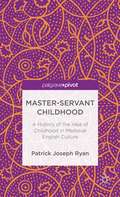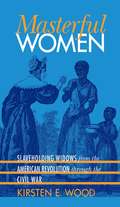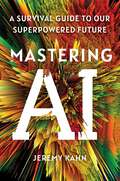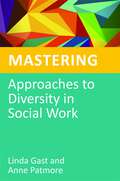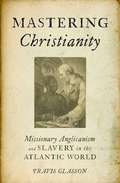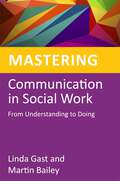- Table View
- List View
Mass Violence and the Self: From the French Wars of Religion to the Paris Commune
by Howard G. BrownMass Violence and the Self explores the earliest visual and textual depictions of personal suffering caused by the French Wars of Religion of 1562–98, the Fronde of 1648–52, the French Revolutionary Terror of 1793–94, and the Paris Commune of 1871. The development of novel media from pamphlets and woodblock printing to colored lithographs, illustrated newspapers, and collodion photography helped to determine cultural, emotional, and psychological responses to these four episodes of mass violence.Howard G. Brown’s richly illustrated and conceptually innovative book shows how the increasingly effective communication of the suffering of others combined with interpretive bias to produce what may be understood as collective traumas. Seeing these responses as collective traumas reveals their significance in shaping new social identities that extended beyond the village or neighborhood. Moreover, acquiring a sense of shared identity, whether as Huguenots, Parisian bourgeois, French citizens, or urban proletarians, was less the cause of violent conflict than the consequence of it. Combining neuroscience, art history, and biography studies, Brown explores how collective trauma fostered a growing salience of the self as the key to personal identity. In particular, feeling empathy and compassion in response to depictions of others’ emotional suffering intensified imaginative self-reflection. Protestant martyrologies, revolutionary "autodefenses," and personal diaries are examined in the light of cultural trends such as the interiorization of piety, the culture of sensibility, and the birth of urban modernism to reveal how representations of mass violence helped to shape the psychological processes of the self.
Mass Violence in Nazi-Occupied Europe
by David Stahel Alex J. KayMass Violence in Nazi-Occupied Europe argues for a more comprehensive understanding of what constitutes Nazi violence and who was affected by this violence. The works gathered consider sexual violence, food depravation, and forced labor as aspects of Nazi aggression. Contributors focus in particular on the Holocaust, the persecution of the Sinti and Roma, the eradication of "useless eaters" (psychiatric patients and Soviet prisoners of war), and the crimes of the Wehrmacht. The collection concludes with a consideration of memorialization and a comparison of Soviet and Nazi mass crimes. While it has been over 70 years since the fall of the Nazi regime, the full extent of the ways violence was used against prisoners of war and civilians is only now coming to be fully understood. Mass Violence in Nazi-Occupied Europe provides new insight into the scale of the violence suffered and brings fresh urgency to the need for a deeper understanding of this horrific moment in history.
Mass Violence in Nazi-Occupied Europe
by David Stahel Alex J. KayThis scholarly anthology explores the violence perpetrated by Nazi Germany, shedding new light on its staggering scale and scope.Mass Violence in Nazi-Occupied Europe argues for a more comprehensive understanding of what constitutes Nazi violence and who was affected by this violence. The works gathered consider sexual violence, food depravation, and forced labor as aspects of Nazi aggression.Contributors focus in particular on the Holocaust, the persecution of the Sinti and Roma, the eradication of “useless eaters” (psychiatric patients and Soviet prisoners of war), and the crimes of the Wehrmacht. The collection concludes with a consideration of memorialization and a comparison of Soviet and Nazi mass crimes.
Mass data surveillance and predictive policing: Contested Foundations and Human Rights Impact (Routledge Frontiers of Criminal Justice)
by Plixavra VogiatzoglouThis book critically assesses legal frameworks involving the bulk processing of personal data, initially collected by the private sector, to predict and prevent crime through advanced profiling technologies. In the European Union (EU), mass data surveillance currently engages three sectors: electronic communications (under the e-Privacy Directive), air travelling (under the Passenger Name Records Directive), and finance (under the Anti-Money Laundering Directive), and increasingly intersects with the deployment of predictive policing techniques. The book questions the legitimacy and impact of these frameworks in light of the EU’s powers to provide security while safeguarding fundamental rights, particularly privacy, data protection, e-ective remedy, fair trial, and presumption of innocence.Focusing on the security shift towards forestalling crime before it occurs, the book identifies its distinct characteristics, such as the blurred lines between the public and private sector actors, and interrogates whether the legal bases and traditional theories on security can account for it. The book further explores the challenges these pre-crime practices pose, including their questionable e-ectiveness and the ambiguous application of human rights safeguards in situations where no crime has been committed, yet individuals face consequences as a result of deploying predictive analytics on mass amounts of commercially collected personal data. In examining the interference with several fundamental rights, the book also highlights aspects neglected by the jurisprudence of the Court of Justice of the European Union and the European Court of Human Rights, such as the expansive nature and the collective and cumulative e-ects of these frameworks.
Mass-Market Fiction and the Crisis of American Liberalism, 1972–2017
by Michael J. BlouinMass-Market Fiction and the Crisis of American Liberalism, 1972–2017 tracks the transformation of liberal thought in the contemporary United States through the unique lens of the popular paperback. The book focuses on cultural shifts as they appear in works written by some of the most widely-read authors of the last fifty years: the idea of love within a New Economy (Danielle Steel), the role of government in scientific inquiry (Michael Crichton), entangled political alliances and legacies in the aftermath of the 1960s (Tom Clancy), the restructured corporation (John Grisham), and the blurred line between state and personal empowerment (Dean Koontz). To address the current crisis, this book examines how the changed character of American liberalism has been rendered legible for a mass audience.
Mass-Produced Original Paintings, the Psychology of Art, and an Everyday Aesthetics
by Martin S. LindauerThis book examines the contribution of mass-produced original painting to the psychology of art, psychological aesthetics, and art criticism. Mass-produced paintings are an inexpensive, accessible, ubiquitous, and hand-painted popular art by anonymous artists or teams. Sold in an array of outlets, ranging from flea markets to shopping centers to cruise ships, they decorate hotels, offices, and homes. Addressed is their neglect in current scholarship in favor of a nearly exclusive investigation of the high arts and their audiences, as represented by museum paintings. Lindauer contextualizes his analysis by tracing the historical origins of this type of painting, popular art in general, and their evolutionary trajectory, exploring issues including: the impact of art and artists’ creativity on viewers; the overemphasis on originality and name recognition; what is art and who can be called an artist; and the extension of aesthetics to include an everyday kind. The book concludes with directions for future research in the popular and traditional arts, the psychology of art, and, more broadly, the ties that transcend barriers between science, the arts, and the humanities. It will appeal to students and scholars from across the fields of psychology, sociology, philosophy, art history, and cultural, media and communication studies.
Massachusetts Book of the Dead: Graveyard Legends and Lore (Haunted America)
by Roxie J. ZwickerA historical tour of the Bay State&’s oldest burial grounds—and the sometimes-spooky stories behind them. Massachusetts's historic graveyards are the final resting places for tales of the strange and supernatural. From Newburyport to Truro, these graveyards often frighten the living, but the dead who rest within them have stories to share with the world they left behind. While Giles Corey is said to haunt the Howard Street Cemetery in Salem, cursing those involved in the infamous witch trials, visitors to the Forest Hills Cemetery in Jamaica Plain enjoy an arboretum and a burial ground with Victorian-era memorials. One of the oldest cemeteries in Massachusetts, Old Burial Hill in Marblehead, has been the final resting place for residents for nearly 375 years. Author Roxie Zwicker tours the Bay State's oldest burial grounds, exploring the stones, stories and supernatural lore of these hallowed places. Includes photos
Massacre at Amritsar (Routledge Revivals)
by Rupert FurneauxFirst published in 1963, Massacre at Amritsar recreates the terrible scene of the Jallianwala Bagh from the stories of eyewitnesses and survivors. General Dyer’s action at Amritsar on April 13, 1919 flared up into one of the most heated political and moral controversies of 20th century. Was he right in firing without warning on the group which had gathered in defiance of his orders? And in continuing to fire after they had started to disperse? Did he thereby save Punjab from worse bloodshed, and all India, perhaps, from a second Mutiny? Or did he commit a cold-blooded, purposeless massacre, for which no excuse was possible? The Army, which had condoned his act on his first explanation, could not stomach his arrogant replies at the enquiry. The Government of India described Dyer’s act as ‘monstrous.’ And perhaps more than any other single factor the massacre consolidated Indian opinion behind the campaign for independence. Yet a large section of the British public backed Dyer; a huge subscription was raised for him, and the House of Lords exonerated him. This book examines the circumstances that led up to the massacre and the deplorable actions that followed it and offers a new solution to the enigma of Dyer’s mind, making it an important read for students of history, South Asian studies, area studies and for the people of any erstwhile colonized nation.
Massacre of the Dreamers
by Ana Castillo Clarissa Pinkola EstésGustavus Myers Outstanding Book Award from the Gustavus Myers Center for the Study of Bigotry and Human Rights This new edition of an immensely influential book gives voice to Mexic Amerindian women silenced for hundreds of years by the dual censorship of being female and indigenous. Castillo replaced the term "Chicana feminism" with "Xicanisma" to include mestiza women on both sides of the border. In history, myth, interviews, and ethnography Castillo revisits her reflections on Chicana activism, spiritual practices, sexual attitudes, artistic ideology, labor struggles, and education-related battles. Her book remains a compelling document, enhanced here with a new afterword that reexamines the significance of Our Lady of Guadalupe.
Massacre of the Dreamers: Essays on Xicanisma. 20th Anniversary Updated Edition.
by Ana CastilloGustavus Myers Outstanding Book Award from the Gustavus Myers Center for the Study of Bigotry and Human RightsThis new edition of an immensely influential book gives voice to Mexic Amerindian women silenced for hundreds of years by the dual censorship of being female and indigenous. Castillo replaced the term &“Chicana feminism&” with &“Xicanisma&” to include mestiza women on both sides of the border. In history, myth, interviews, and ethnography Castillo revisits her reflections on Chicana activism, spiritual practices, sexual attitudes, artistic ideology, labor struggles, and education-related battles. Her book remains a compelling document, enhanced here with a new afterword that reexamines the significance of Our Lady of Guadalupe.
Massacre of the Innocents: Infanticide in Great Britain 1800-1939 (Routledge Library Editions: The History of Crime and Punishment #7)
by Lionel RoseBefore contraception was generally available, and when abortion was fraught with danger, infanticide was a common solution to the problem of unwanted children. Massacre of the Innocents, first published in 1986, shows the causes and consequences of the high tide of infanticide in Victorian Britain. Lionel Rose describes the ways in which unwanted and ‘surplus’ infants were disposed of, and the economic and social pressures on women to rid themselves of their burdens by covert criminal and sub-criminal means. He discusses the activities of infanticidal and abortionist midwives, and shows how the practices of wet nursing and baby farming were closely related to infanticide. Unscrupulous insurance salesman even turned infanticide into a profitable business, in their reckless grab for commissions. Infanticide declined with the growing practice of contraception, the lessening of pressure of unmarried mothers, and as adoption was made easier. This is a hard-hitting, scrupulously documented piece of social history. This title will be of interest to students of history and criminology.
Massacre: The Life and Death of the Paris Commune
by John MerrimanThe Paris Commune lasted for only 64 days in 1871, but during that short time it gave rise to some of the grandest political dreams of the nineteenth century—before culminating in horrific violence. Following the disastrous French defeat in the Franco-Prussian War, hungry and politically disenchanted Parisians took up arms against their government in the name of a more just society. They expelled loyalists and soldiers and erected barricades in the streets. In Massacre, John Merriman introduces a cast of inimitable Communards—from les pétroleuses (female incendiaries) to the painter Gustave Courbet—whose idealism fueled a revolution. And he vividly recreates the Commune’s chaotic and bloody end when 30,000 troops stormed the city, burning half of Paris and executing captured Communards en masse. A stirring evocation of the spring when Paris was ablaze with cannon fire and its citizens were their own masters, Massacre reveals how the indomitable spirit of the Commune shook the very foundations of Europe.
Masscult and Midcult: Essays Against the American Grain
by Louis Menand John Summers Dwight MacdonaldA New York Review Books OriginalAn uncompromising contrarian, a passionate polemicist, a man of quick wit and wide learning, an anarchist, a pacifist, and a virtuoso of the slashing phrase, Dwight Macdonald was an indefatigable and indomitable critic of America's susceptibility to well-meaning cultural fakery: all those estimable, eminent, prizewinning works of art that are said to be good and good for you and are not. He dubbed this phenomenon "Midcult" and he attacked it not only on aesthetic but on political grounds. Midcult rendered people complacent and compliant, secure in their common stupidity but neither happy nor free.This new selection of Macdonald's finest essays, assembled by John Summers, the editor of The Baffler, reintroduces a remarkable American critic and writer. In the era of smart, sexy, and everything indie, Macdonald remains as pertinent and challenging as ever.
Master Narratives and their Discontents (Theories of Modernism and Postmodernism in the Visual Arts #Vol. 1)
by James ElkinsIn this bracing engagement with the many versions of art history, James Elkins argues that the story of modernism and postmodernism is almost always told in terms of four narratives. Works of art are either seen as modern or postmodern, or praised for their technical skill or because of the politics they appear to embody. These are master narratives of contemporary criticism, and each leads to a different understanding of what art is and does. Both a cogent overview of the state of thinking about art and a challenge to think outside the art historical box, Master Narratives and their Discontents is the first volume in a series of short books on the theories of modernism by leading art historians on twentieth-century art and art criticism.
Master Of Rock: The Biography of John Gill
by Pat AmentCelebrated as the father of modern bouldering, John Gill is an awe-inspiring climber with immense talent. This book provides an insight into the life of Gill as he developed into a world leading and climbing pioneer and an inspirational climber. He is a pioneer in his approach to bouldering with his impressive accomplishments, such as the one-arm f
Master Peace: Lebanon's Violence and the Politics of Expertise (The Ethnography of Political Violence)
by Nikolas KosmatopoulosExamines the politics of expertise in the practices of peacemaking in post–civil war LebanonBased on multi-sited ethnographic research centering on Beirut, but tracing international peace work as far as Switzerland and the United States, Master Peace examines the politics of expertise in the application of metropolitan theories of violence and practices of peacemaking in post–civil war Lebanon. Through ethnographic encounters, archival research, and interviews that shed light on the worlds of academic research, UN agencies, NGOs, and think tanks, Nikolas Kosmatopoulos argues that so-called experts, from violence researchers to peace professionals, have often misrepresented and exacerbated the violence they claim to be tackling, through their deployment of racialized tropes of conflict and communalizing peace practices.The assemblage of these tropes and practices, which Kosmatopoulos calls “master peace,” naturalizes social and structural inequalities by collapsing them into supposedly innate cultural and sectarian divisions. Master peace installs unequal relations of domination through the work of metropolitan theories, as in “ethnic conflict” and “failed state,” and practices, such as conflict resolution workshops and crisis reports, converting the radical demand for just peace into a postcolonial regime of dependence on technocratic tools, unaccountable experts, and external donors.Kosmatopoulos shows how master peace has been framing debates, designing interventions of peace and war, and defining the problem of violence in Lebanon and the Middle East for decades, to deleterious effect. As the supposed moral high ground that justifies external intervention and precludes political solutions or democratic forms of action, master peace has obscured the geopolitical and ideological nature of violence in the region, substituting democratic notions of peace for an elitist antipolitics of expertise characterized by dependence, domination, and epistemic violence.
Master Plans and Minor Acts: Repairing the City in Post-Genocide Rwanda
by Shakirah E. HudaniAn examination of planning, place, and the politics of repair in post-genocide Rwanda. Master Plans and Minor Acts examines a “material politics of repair” in post-genocide Rwanda, where in a country saturated with deep historical memory, spatial master planning aims to drastically redesign urban spaces. How is the post-conflict city reconstituted through the work of such planning, and with what effects for material repair and social conciliation? Through extended ethnographic and qualitative research in Rwanda in the decades after the genocide of 1994, this book questions how repair after conflict is realized amidst large-scale urban transformation. Bridging African studies, urban studies, and human geography in its scope, this work ties Rwanda’s transformation to contexts of urban change in other post-conflict spaces, bringing to the fore critical questions about the ethics of planning in such complex geographies.
Master-Servant Childhood: A History of the Idea of Childhood in Medieval English Culture
by Patrick Joseph RyanAn interdisciplinary synthesis that offers a new understanding of childhood in the Middle Ages as a form of master-servant relation embedded in an ancient sense of time as a correspondence between earthly change and eternal order.
Masterful Women
by Kirsten E. WoodMany early-nineteenth-century slaveholders considered themselves "masters" not only over slaves, but also over the institutions of marriage and family. According to many historians, the privilege of mastery was reserved for white males. But as many as one in ten slaveholders--sometimes more--was a widow, and as Kirsten E. Wood demonstrates, slaveholding widows between the American Revolution and the Civil War developed their own version of mastery.Because their husbands' wills and dower law often gave women authority over entire households, widowhood expanded both their domestic mandate and their public profile. They wielded direct power not only over slaves and children but also over white men--particularly sons, overseers, and debtors. After the Revolution, southern white men frequently regarded powerful widows as direct threats to their manhood and thus to the social order. By the antebellum decades, however, these women found support among male slaveholders who resisted the popular claim that all white men were by nature equal, regardless of wealth. Slaveholding widows enjoyed material, legal, and cultural resources to which most other southerners could only aspire. The ways in which they did--and did not--translate those resources into social, political, and economic power shed new light on the evolution of slaveholding society.
Mastering AI: A Survival Guide to Our Superpowered Future
by Jeremy KahnA Fortune magazine journalist draws on his expertise and extensive contacts among the companies and scientists at the forefront of artificial intelligence to offer dramatic predictions of AI&’s impact over the next decade, from reshaping our economy and the way we work, learn, and create to unknitting our social fabric, jeopardizing our democracy, and fundamentally altering the way we think.Within the next five years, Jeremy Kahn predicts, AI will disrupt almost every industry and enterprise, with vastly increased efficiency and productivity. It will restructure the workforce, making AI copilots a must for every knowledge worker. It will revamp education, meaning children around the world can have personal, portable tutors. It will revolutionize health care, making individualized, targeted pharmaceuticals more affordable. It will compel us to reimagine how we make art, compose music, and write and publish books. The potential of generative AI to extend our skills, talents, and creativity as humans is undeniably exciting and promising. But while this new technology has a bright future, it also casts a dark and fearful shadow. AI will provoke pervasive, disruptive, potentially devastating knock-on effects. Leveraging his unrivaled access to the leaders, scientists, futurists, and others who are making AI a reality, Kahn will argue that if not carefully designed and vigilantly regulated AI will deepen income inequality, depressing wages while imposing winner-take-all markets across much of the economy. AI risks undermining democracy, as truth is overtaken by misinformation, racial bias, and harmful stereotypes. Continuing a process begun by the internet, AI will rewire our brains, likely inhibiting our ability to think critically, to remember, and even to get along with one another—unless we all take decisive action to prevent this from happening. Much as Michael Lewis&’s classic The New New Thing offered a prescient, insightful, and eminently readable account of life inside the dot-com bubble, Mastering AI delivers much-needed guidance for anyone eager to understand the AI boom—and what comes next.
Mastering Christianity: Missionary Anglicanism and Slavery in the Atlantic World
by Travis GlassonThis book provides a unique perspective on the development and entrenchment of a pro-slavery ideology by showing how English religious thinking furthered the development of slavery and supported the institution around the Atlantic world.
Mastering Communication in Social Work: From Understanding to Doing
by Jane Wonnacott Linda Gast Martin BaileyCommunication skills are fundamental to effective social work practice. Accessible and easy-to-read, Mastering Communication in Social Work is designed to help you develop these essential skills. It explores the basics of how communication works, the factors that influence how effectively you attend to and convey information, and how you can improve your communication. Particular attention is given to the challenges posed by difficult clients and the cultural dimensions of communication. Gast and Bailey put forward a reflective model for practice designed help you break bad habits and develop a wider repertoire of communication behaviours. Practice vignettes and exercises for the reader are included throughout. This book is essential reading for social work students, practitioners, managers, practice teachers and assessors, and trainers, as well as those in allied professions.
Mastering Corporate Communication: A Modern Guidebook for Future-fit Strategies, Tools and Skills (Future of Business and Finance)
by Anne Katrine Lund Mette Refshauge"Mastering Corporate Communication" is a comprehensive guide designed to assist communication professionals in navigating the new world of stakeholder capitalism. With the rise of new media, corporate responsibility demands and the constant battle for attention, professionals are faced with an array of challenges. The book offers an overview of relevant theories and techniques to help professionals master the new reality of corporate communication. It provides a rare glimpse into the corporate machine room of a global company, offering valuable insights and inspiration to communication professionals. Leading professors from all around the world share their insights and advice, giving readers an opportunity to develop excellent corporate communication skills. The competitive environment requires a new mindset and a necessary agility, and this guide is the perfect resource to help communication professionals thrive in this ever-evolving landscape. With "Mastering Corporate Communication" students and professionals can find inspiration in effective approaches to communication challenges and ways to develop essential tools and competencies to succeed in their careers.
